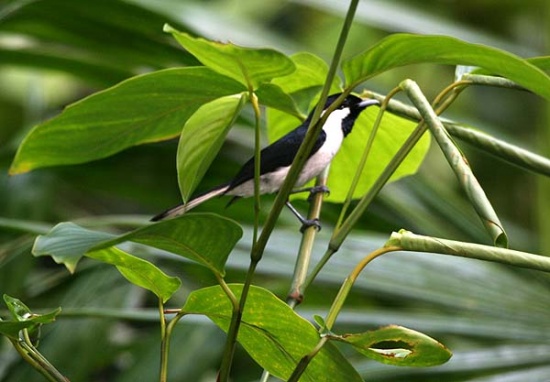JohnN-1520 (talk | contribs) |
|||
| (10 intermediate revisions by 6 users not shown) | |||
| Line 1: | Line 1: | ||
| − | + | '''Alternative name: Buru Monarch''' | |
| − | [[Image:Black-tipped_Monarch.jpg|thumb|550px|right|Photo by < | + | [[Image:Black-tipped_Monarch.jpg|thumb|550px|right|Photo by {{user|mehdhalaouate|mehdhalaouate}}<br />Buru island, [[Moluccas]], August 2006]] |
| + | ;[[:Category:Symposiachrus|Symposiachrus]] loricatus | ||
| + | ''Monarcha loricatus'' | ||
==Identification== | ==Identification== | ||
| − | < | + | 18 cm (7 in) |
| + | *Bluish-black crown and majority of upperparts | ||
| + | *Black forehead and face | ||
| + | |||
| + | ==Distribution== | ||
| + | Buru: found in the lowlands. [[Moluccas]], [[Indonesia]], South-east [[Asia]]. | ||
| + | ==Taxonomy== | ||
| + | This is a [[Dictionary_M-O#M|monotypic]] species<sup>[[#References|[1]]]</sup>.<br /> | ||
| + | Formerly placed in genus ''[[:Category:Monarcha|Monarcha]]''. | ||
| + | |||
| + | ==Habitat== | ||
| + | Lowland and sub-montane primary and shrubby secondary forests. | ||
| + | ==Behaviour== | ||
| + | ====Diet==== | ||
| + | There is little detailed information available. They eat mostly invertebrates, foraging alone or in pairs in the understorey. | ||
| + | ====Breeding==== | ||
| + | The nest is a cup woven from creeper tendrils, leaves and moss. The clutch consists of 1-2 eggs. | ||
| + | ==References== | ||
| + | #{{Ref-Clements6thAug17}}#Avibase | ||
| + | #Handbook of the Birds of the World Alive (retrieved Oct 2017) | ||
| + | {{Ref}} | ||
==External Links== | ==External Links== | ||
| − | {{GSearch| | + | {{GSearch|Symposiachrus+loricatus}} |
| − | [[Category:Birds]] | + | {{GS-checked}} |
| + | [[Category:Birds]][[Category:Symposiachrus]] | ||
Latest revision as of 10:04, 6 August 2023
Alternative name: Buru Monarch
- Symposiachrus loricatus
Monarcha loricatus
Identification
18 cm (7 in)
- Bluish-black crown and majority of upperparts
- Black forehead and face
Distribution
Buru: found in the lowlands. Moluccas, Indonesia, South-east Asia.
Taxonomy
This is a monotypic species[1].
Formerly placed in genus Monarcha.
Habitat
Lowland and sub-montane primary and shrubby secondary forests.
Behaviour
Diet
There is little detailed information available. They eat mostly invertebrates, foraging alone or in pairs in the understorey.
Breeding
The nest is a cup woven from creeper tendrils, leaves and moss. The clutch consists of 1-2 eggs.
References
- Clements, J. F., T. S. Schulenberg, M. J. Iliff, D. Roberson, T. A. Fredericks, B. L. Sullivan, and C. L. Wood. 2017. The eBird/Clements checklist of birds of the world: v2017, with updates to August 2017. Downloaded from http://www.birds.cornell.edu/clementschecklist/download/
- Avibase
- Handbook of the Birds of the World Alive (retrieved Oct 2017)
Recommended Citation
- BirdForum Opus contributors. (2025) Black-tipped Monarch. In: BirdForum, the forum for wild birds and birding. Retrieved 14 May 2025 from https://www.birdforum.net/opus/Black-tipped_Monarch
External Links
GSearch checked for 2020 platform.




